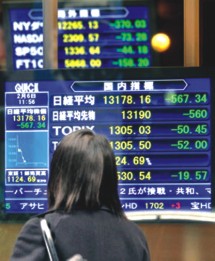Perspective
Happy Birthday Mr Recession!
Faruq Hasan
 |
| Bangladesh economy has remained unfazed by the global recession. |
While we were making merry and celebrating Eid, the biggest economic crisis in almost a century celebrated its first anniversary. Exactly a year ago, the first signs of a total financial meltdown announced itself with a bang, with the collapse of Lehman Brothers, a household name in investment banking. The rumbles of the impending quake were felt even in the insulated shores of Bangladesh where the Dhaka Stock Exchange lost about a hundred points in a week and dropped to its lowest index score in more than a decade. One year on, with the green shoots of hope and recovery slowly surfacing, the world still looks like a somnambulist trudging its way around a crowded room of panicky investors and everyday people who had invested their whole live savings into the market.
Although the crisis is exactly one year old, its roots can be traced farther back to the US subprime debacle, which occurred in 2007-08. First, bad loans were incurred by banks, resulting in excessive credit expansion. Second, poor corporate governance and lack of transparency among major financial conglomerates had intensified the financial meltdown. And third, little global coordination between national regulators and international banks and investment houses has also prolonged the financial turmoil and spread it to distant and often blameless shores. Bottom line: both banks and their clients got caught with their hands in the cookie jar. We simply spent more than we earned and banks were just looking at the short term picture instead of sustainability issues.
The overall impact of the global recession is now evident across the world. What started as a sub-prime crisis in the US sometime in the first half of 2008 has engulfed almost all countries. Consequently, most countries have witnessed their economy, modeled on the ideas of neo-liberal capitalism, falling like nine pins. A majority of the foreign banks, which till very recently were the epitome of private sector efficiency and global excellence, are lying insolvent and hollow.
Though Bangladesh remained largely insulated from any direct impact of the financial crisis due to the semi-closed nature of our economy, conservative banking sector norms and there is relative ignorance about the exotic derivative products that initiated the crisis. We should look across to the West and derive important lessons from the crisis.
 |
| Most neo-liberal economies across the world have been hit hard. |
The biggest lesson is about what to do with liquidity, or a surplus of it. Liquidity is a dangerous weapon, a double edged sword which can be fatal if not used diligently. Excess liquidity, very often, tends to find its way to the unproductive sectors of the economy threatening to create a price bubble. Our local banksboth government and private oneshave a surfeit of investment funds and are constantly looking for the most bang out of their taka. Though this liquidity is necessary to jumpstart growth in the initial stages of recovery, it has to be withdrawn once the economy shows signs of self sustenance, lest it should create another asset price bubble.
A good example would be property prices in and around Dhaka that have been fueled by excess liquidity. Private commercial banks have led to a pseudo-bubble in the housing sector leading to exorbitant apartment prices that has basically priced out the middle-classthe people who are genuinely in need of a home. What this has meant is that consumers in higher income brackets now posses two or even three homes which they often rent out at very high prices. Needless to say, this was exactly how the US housing bubble was created.
The next big lesson we could learn is that selected protectionism helps. Protectionism has become a growing phenomenon in the post Lehman era, as nations opt for direct and indirect barriers to trade. Historically, the governments of major economies including the US, who were former proponents of globalisation, are now suddenly staunch advocates of protectionism, which has adverse implications for export dependent emerging nations.
The single most important lesson that Bangladesh should take from this crisis our need for a strong domestic industry that is not export dependent. It is thus important to protect the domestic industry from the onslaught of global giants, to a certain extent. Currently the Bangladeshi economy is a two trick pony: we either export clothes or our people. We need to diversify this age old tradition, and for that to happen, the Government of Bangladesh needs to identify sectors that would cater to local demand first but also have big export potential as well. The pharmaceutical sector should be an obvious target, but other sectors should include leather, agriculture and even tourism.
The third lesson is simple and applies to both the finance sector and common people like you and me: austerity. For quite some time, we had been getting away with ill-planned and poorly executed expansion plans and projects and wasteful expenditures. Our government builds roads and bridges that last a year, cut out power lines in the middle of the city only to have them replaced within a month, and subsidize sectors of the economy that really have no potential growth like jute. Fiscal expansion with productivity is a one way ticket to bankruptcy. Ask millions of Americans who are now literally homeless.
The crisis may be one year old, but it remains to be seen whether this will be its only birthday or the first of quite a few to follow. While most Bangladeshis have only read about the crisis and thankfully not had to live it, it's only a matter of time since we start importing practices from the West and manufacture our own home grown crisis.
Copyright
(R) thedailystar.net 2009 |
